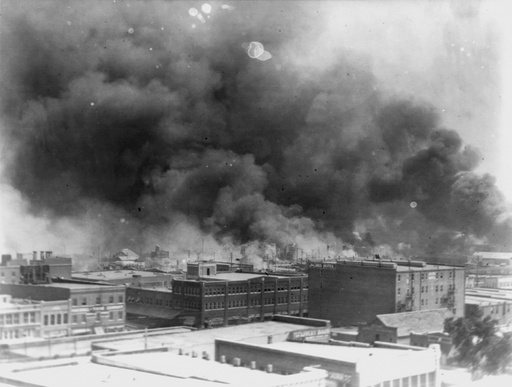OKLAHOMA CITY (AP) — Attorneys for the last two remaining survivors of the 1921 Tulsa Race Massacre asked the Oklahoma Supreme Court on Tuesday to reconsider the case they dismissed last month and called on the Biden administration to help the two women seek justice.
Viola Fletcher, 110, and Lessie Benningfield Randle, 109, are the last known survivors of one of the single worst acts of violence against Black people in U.S. history. As many as 300 Black people were killed; more than 1,200 homes, businesses, schools and churches were destroyed; and thousands were forced into internment camps overseen by the National Guard when a white mob, including some deputized by authorities, looted and burned the Greenwood District, also known as Black Wall Street.
In a petition for rehearing, the women asked the court to reconsider its 8-1 vote upholding the decision of a district court judge in Tulsa last year to dismiss the case.
“Oklahoma, and the United States of America, have failed its Black citizens,” the two women said in a statement read by McKenzie Haynes, a member of their legal team. “With our own eyes, and burned deeply into our memories, we watched white Americans destroy, kill, and loot.”
“And despite these obvious crimes against humanity, not one indictment was issued, most insurance claims remain unpaid or were paid for only pennies on the dollar, and Black Tulsans were forced to leave their homes and live in fear.”
Attorney Damario Solomon Simmons also called on the U.S. Department of Justice to open an investigation into the massacre under the Emmett Till Unsolved Civil Rights Crime Act of 2007, which allows for the reopening of cold cases of violent crimes against Black people committed before 1970. A spokesperson for the DOJ declined comment.
The lawsuit was an attempt under Oklahoma’s public nuisance law to force the city of Tulsa and others to make restitution for the destruction. Attorneys also argued that Tulsa appropriated the historic reputation of Black Wall Street “to their own financial and reputational benefit.” They argue that any money the city receives from promoting Greenwood or Black Wall Street, including revenue from the Greenwood Rising History Center, should be placed in a compensation fund for victims and their descendants.
—
Rephrased content:
Attorneys representing the final two survivors of the 1921 Tulsa Race Massacre are urging the Oklahoma Supreme Court to revisit the case dismissed last month. Viola Fletcher, aged 110, and Lessie Benningfield Randle, aged 109, are the only known survivors of the violent incident that resulted in the deaths of as many as 300 Black individuals and the destruction of over 1,200 properties in the Greenwood District, commonly known as Black Wall Street. Following a petition for rehearing, the women seek the court to reconsider its decision to uphold the dismissal of the case by a district court judge in Tulsa last year.
In a statement delivered by McKenzie Haynes, a member of their legal team, the women expressed their disappointment in the lack of justice and accountability following the massacre. They highlighted the failure of Oklahoma and the United States to address the crimes committed against Black citizens during the atrocity, emphasizing the destruction, killings, and looting they witnessed. They mentioned the absence of any indictments, the non-payment or inadequate compensation of insurance claims, and the forcible displacement of Black Tulsans from their homes.
Moreover, Attorney Damario Solomon Simmons is calling upon the U.S. Department of Justice to investigate the massacre under the Emmett Till Unsolved Civil Rights Crime Act of 2007. The Act permits the reopening of cold cases involving violent crimes against Black individuals that occurred before 1970. Nonetheless, a DOJ spokesperson declined to comment on the matter.
The legal action was pursued under Oklahoma’s public nuisance law, with the aim of compelling the city of Tulsa and other entities to provide restitution for the damages caused. The attorneys also argue that Tulsa has unjustly benefited from the historic legacy of Black Wall Street, utilizing it for financial gain and reputation enhancement. They suggest that any funds received by the city from activities related to Greenwood or Black Wall Street, such as the Greenwood Rising History Center, should be allocated to a compensation fund for the massacre’s victims and their descendants.
This website uses cookies so that we can provide you with the best user experience possible. Cookie information is stored in your browser and performs functions such as recognising you when you return to our website and helping our team to understand which sections of the website you find most interesting and useful.
